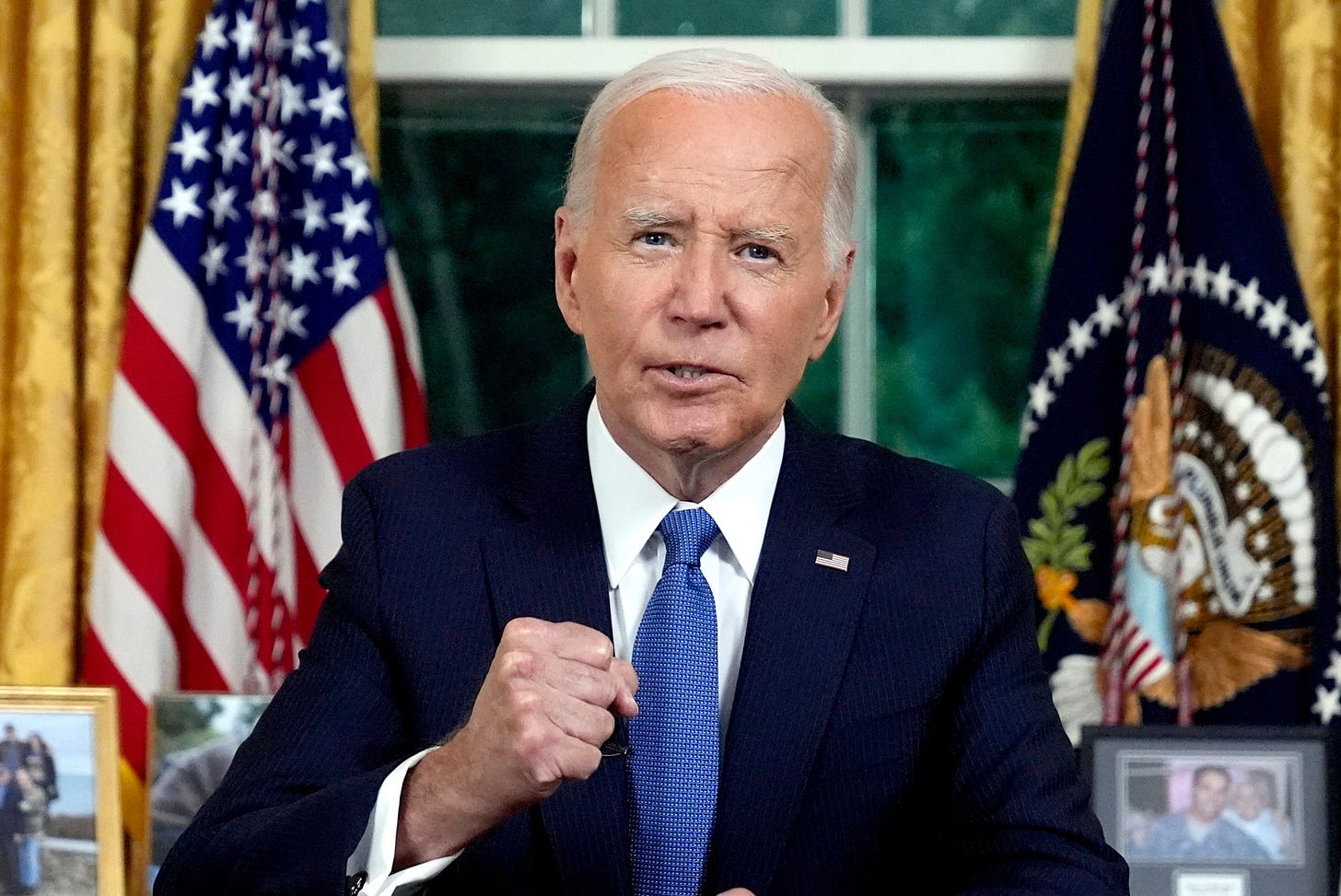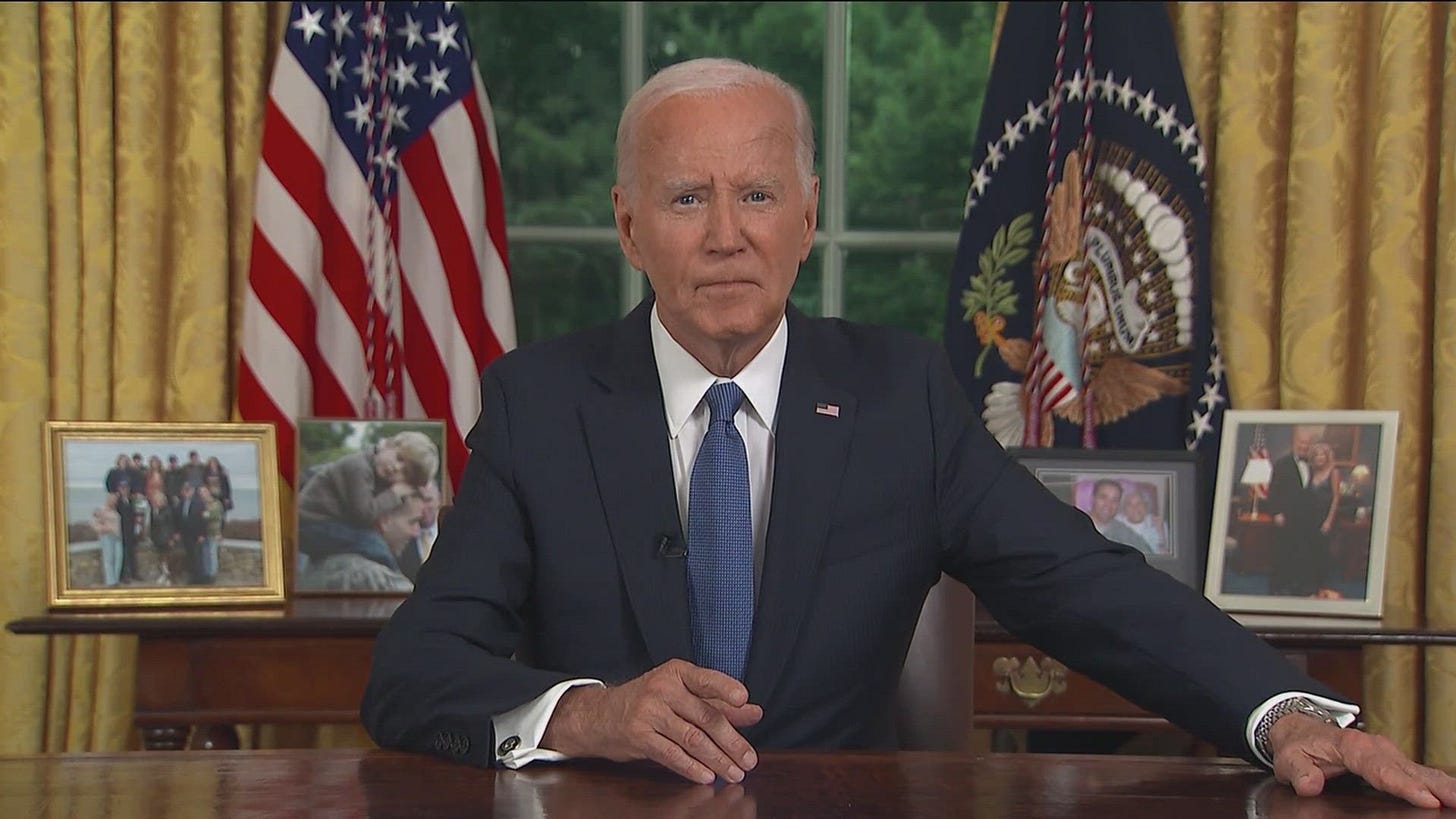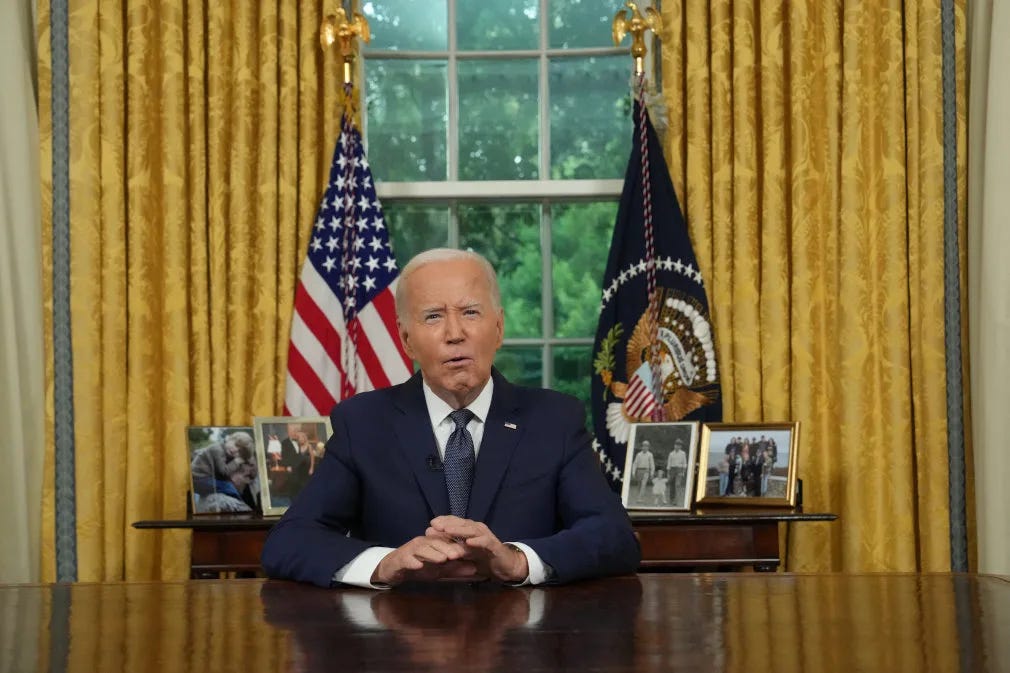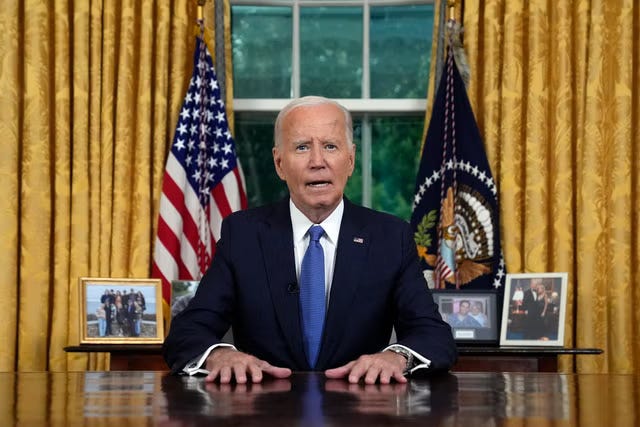What Biden’s Speech Will Mean to History
He was down. And then, on his own terms, he counted himself out.
In order to study politics and history with integrity, you have to be able to set aside your personal feelings and use objectivity. It’s a skill that can be improved with time, but few have mastered it, which is one reason why most political discourse is just yelling and insults.
We all know that time and distance increases objectivity. Most of us can look at the writings of George Washington now and not feel anger or despair. We can critically examine what was said and left unsaid, and look at Washington’s record as both a leader and an enslaver and see with relative clarity who and what he was.
Here is my attempt to bring some history teacher objectivity to President Biden’s speech resigning from his candidacy. Set aside your personal feelings about Biden and pretend you are a student 100 years in the future who is assigned to read or watch this speech, and that you have no personal emotions wrapped up in it. If I were teaching a lesson to a classroom of students, here are some of the things we might discuss.
When he began, Biden’s voice sounded soft. He looked tan. He wore a bright blue tie. Behind him were carefully arranged photographs of his family, two on each side. He did not appear on camera with tears or notable facial expressions. He sounded sad. Wistful. And proud.
At the end of a 50 year career in public service, Biden expected those from the opposing party to lay into him. But he could not have foreseen his own party turning on him because of his age and apparent physical limitations. Weeks prior, a poor debate performance against former President Trump caused significant embarrassment and caught his campaign flat-footed, unable to go on the offense.
Longtime supporters paused their donations. It began to look as though Biden took a punch to the nose, and as he lay bleeding in the ring, the referee began to count. People stood over him, some screaming at him to get up, some mocking him into staying down. The crowd roared their pleadings and disapprovals.
By the time the ref reached 8, Biden began to stir. By 9, he was pushing himself up, and by 10, he stood.
He was down. And then, on his own terms, he counted himself out.
“My fellow Americans,” he said into the camera, “I’m speaking to you tonight from behind the Resolute Desk in the Oval Office. In this sacred space, I’m surrounded by portraits of extraordinary American presidents. Thomas Jefferson wrote the immortal words that guide this nation. George Washington showed us presidents are not kings. Abraham Lincoln implored us to reject malice. Franklin Roosevelt inspired us to reject fear.”
Biden clasped his hands. His voice becomes more gentle. “I revere this office, but I love my country more.”
“It’s been the honor of my life to serve as your president. But in the defense of democracy, which is at stake, I think it’s more important than any title…this sacred task of perfecting our union is not about me, it’s about you. Your families, your futures.”
He spoke of how America is at an inflection point, and how the decisions we make now will affect America for generations to come. “America,” he said, “is going to have to choose between moving forward or backward, between hope and hate, between unity and division.”
Biden spoke repeatedly of his desire to protect democracy. He asks, “We have to decide: Do we still believe in honesty, decency, respect, freedom, justice, and democracy?”
It’s clear that Biden knew this was a legacy-making moment for him. He knew that history was watching, and he wanted to make a case for his legacy as president. “In recent weeks, it has become clear to me that I need to unite my party in this critical endeavor. I believe my record as president, my leadership in the world, my vision for America’s future, all merited a second term. But nothing, nothing can come in the way of saving our democracy. That includes personal ambition.”
“The time and place is now,” he said, conceding that younger and newer voices are needed on the political stage.
The President went on to lay out his goals for the next six months as he remains president: growing the economy, lowering costs for working families, defending civil and reproductive rights, protecting children from gun violence and the climate crisis. Supreme Court reform is also essential to our democracy, he said.
He spoke of what he was proud of: that the United States was not at war anywhere in the world, that America is a strong ally and has strong allies, that the country has moved past a global pandemic, that he has lowered prescription drugs for seniors, and violent crime is at a 50 year low.
As his 11 minute speech drew to a close, he said, “We are all created equal, endowed by our creator with certain inalienable rights: life, liberty, the pursuit of happiness. We’ve never fully lived up to it — to this sacred idea — but we’ve never walked away from it either. And I do not believe the American people will walk away from it now.”
He endorsed his Vice President, Kamala Harris, for president, and then he figuratively passed the torch. “History is in your hands,” he says, squeezing his fist, “the power’s in your hands. The idea of America lies in your hands.”
He signed off by reminding the American people that there is nothing beyond their capacity when they work together.
“God bless you all,” he said. “And may God protect our troops.”
Never before has a president run for reelection only to bow out of the race a few months before the election. The incumbency is a very powerful force in electoral victories, and to give that up was not a decision that was arrived at lightly.
Students of history will see several themes, chief among them protecting democracy. Biden references a number of former leaders that he felt helped guard the American experiment, including Ben Franklin, George Washington, Abraham Lincoln, and Franklin Delano Roosevelt. In calling on them, he hopes to cast his lot with other leaders history has smiled upon. They will see a man who sacrificed his personal ambitions for what he believed was the greater good, walking away from power as America’s first president had.
But he also brings up Civil Rights leaders: Martin Luther King, Rosa Parks, and Cesar Chavez. All people who fought for the little guy, which has been, as Joe Biden sees it, the theme of his life. He references this again when he says America is the only place a kid with a stutter could grow up to sit in the Oval Office as President.
Future students will read the text and judge it to be kind. They may watch the video and see a grandfatherly figure who struggled to speak clearly.
Whatever history decides to call this time period that includes the 2020 election and the COVID pandemic, President Joe Biden will be at the center of the chapter.
And now, as he said, history is in our hands.
Did you watch the speech? I would love to hear your thoughts in the comments.







I loved his speech! As life long Republican until this year, I liked Biden. I never saw him as anything but a kind soul who loves his country. His eyes to me held sadness that it won’t be him going forward to unite this country. And I saw what Trump said and the contrast between them is why I can never vote for that nasty, foul bully again. I’m sorry we are losing Biden but thankful Kamala will carry his torch forward and hopefully be our next president.
Interestingly, I haven’t seen any comments here about the part of the speech that hit me hardest. Towards the very end, his voice softens even more and he says “I hope you have some idea how grateful I am, to all of you.” It quite honestly struck me, and it took me several minutes to realize why. It sounded like me thanking all of my friends for helping me move, or thanking my coworkers for helping me get a big project over the finish line. When we’re flooded with a constant stream of all sorts of people in power who are entitled, who are never satisfied, who complain about fairness even as they treat other people grossly unfairly, and who never consider their privilege in the world, it was remarkable and striking to hear the sitting President of the United States thank us for his job. Because, of course, we are fortunate to live in a place where the power we vest in our leaders flows from us. They don’t have their positions because of force, violence, or some imagined divine birthright - even if they’d rather they did. They are in power because we said they could be. It was incredible to hear that acknowledged in a such a humble way. He then went on to make that exact point in his very next sentence. In a hundred years, I would want a student studying this time and the broader societal context to pick up on the fact that that sentence he spoke is the essence of our democracy here in the United States and echoes the sentiments jn Washington’s Farewell Address. Our leaders - and all leaders - are at their best when they can lead with humility, realize their power comes from the people they serve, and then willingly step aside when the people who they serve let them know that they are no longer the ones who are best suited to the task. It was quite the underrated moment, if you ask me.